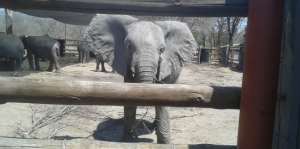
GENEVA – On August 27th, the 18th Conference of the Parties to CITES (the Convention on International Trade in Endangered Species) agreed to restrict exports of wild-caught African elephants to conservation programmes within their natural habitats, except in exceptional circumstances or emergency situations, and where benefits to conservation in Africa are demonstrated. Currently, more than 30 wild baby elephants are being held in enclosures in Zimbabwe. They were initially destined for zoos on other continents, mainly in China. The CITES decisions are now in force. Therefore, the exports cannot proceed without contravening the new rules.
The European Union (EU) played a key role in this historic decision, initiated by the African Elephant Coalition (AEC), a group of over 30 African countries calling for the full protection of elephants at CITES. The EU stated that they have not imported a live elephant in the last ten years, and they do not intend to do so in the future. The EU is to be commended for its actions and as a promoter of global biodiversity. We all now have a responsibility to ensure that the 30 wild baby elephants are rehabilitated within their natural range. In particular, it is important that there are no attempts to subvert the CITES decision by interpreting “exceptional circumstances” or “emergency situations” so it becomes a loophole and used to permit the exports of the elephants held in Zimbabwe.
“If these planned exports go ahead, the exporting and importing countries would be contravening international law”, says Dr. Rosalind Reeve, CITES Project Director of the David Shepherd Wildlife Foundation and legal advisor of Fondation Franz Weber.
“We need to understand that these baby elephants are traumatised”, says Vera Weber, President of the Fondation Franz Weber. “They were caught in the wild and separated from their families. We cannot subject them to more suffering and abuse. The lengthy transit process would be distressing, and the elephants would be condemned to a grim, solitary life in captivity. This would not meet their complex biological and social needs.”
“For these 30 baby elephants already captured, there are workable solutions within Zimbabwe to rehabilitate and release them back into the wild”, says Karen Trendler, Manager of Wildlife Trade and Trafficking of the NSPCA (National Council of Societies for the Prevention of Cruelty to Animals), an organisation that ensures that the protection of wildlife under South African and Zimbabwean law is upheld and respected. “There have been a number of programmes in southern Africa where both captive raised and wild caught ‘tamed and trained‘ elephants have been successfully integrated into a wild population. Some have even been rehabilitated after living in captivity for eight years or more”.
This historic CITES decision has created an opportunity to give these 30 elephants back their lives. Now is the time for the global community to step up and assist with their rehabilitation so they can return to the wild.




 We’ll no longer tolerate your empty, unwarranted attacks – TUC blasts Prof Adei
We’ll no longer tolerate your empty, unwarranted attacks – TUC blasts Prof Adei
 Bawumia donates GHc200,000 to support Madina fire victims
Bawumia donates GHc200,000 to support Madina fire victims
 IMF to disburse US$360million third tranche to Ghana without creditors MoU
IMF to disburse US$360million third tranche to Ghana without creditors MoU
 Truck owner share insights into train collision incident
Truck owner share insights into train collision incident
 Paramount chief of Bassare Traditional Area passes on
Paramount chief of Bassare Traditional Area passes on
 Two teachers in court over alleged illegal possession of BECE papers
Two teachers in court over alleged illegal possession of BECE papers
 Sunyani: Victim allegedly shot by traditional warriors appeals for justice
Sunyani: Victim allegedly shot by traditional warriors appeals for justice
 Mahama vows to scrap teacher licensure exams, review Free SHS policy
Mahama vows to scrap teacher licensure exams, review Free SHS policy
 Government will replace burnt Madina shops with a new three-story, 120-store fac...
Government will replace burnt Madina shops with a new three-story, 120-store fac...
